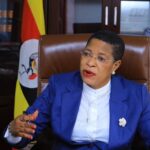Minister Jeje Odong Speaks on Uganda’s Foreign Policy and Regional Security Agenda

Foreign Minister, Jeje Odong, emphasized the country’s commitment to regional integration, security, and peaceful dispute resolution during an address at a Uganda Council on Foreign Relations event. Highlighting the importance of strong bilateral ties and a holistic national security approach, Odong reaffirmed Uganda’s open-door refugee policy.

Foreign Minister, Jeje Odong
Uganda has reaffirmed its commitment to strengthening regional integration and security to protect national interests and enhance cooperation within the region.
The Minister of Foreign Affairs, Hon. Jeje Odong, emphasized that the country will focus on the peaceful resolution of disputes and uphold respect for international law, which are key pillars in maintaining stability across the region.
Hon. Odong made these remarks while addressing diplomats, government officials, and leaders from various sectors on Uganda’s Foreign Policy at an event organized by the Uganda Council on Foreign Relations (UCFR) at Fairway Hotel, Kampala, on October 15, 2024.
He highlighted the importance of strong bilateral relationships with neighboring countries as the foundation for mutual growth and collaboration. He further emphasized that working closely with the UCFR is crucial for achieving these strategic objectives.
“The essence of our foreign policy is to protect our national interests and ensure the survival of our nation in an increasingly complex international landscape. National security is the survival of the state in an anarchic international system,” he stated.

Some of the dignitaries that graced the event at Fairway Hotel, Kampala, on October 15, 2024.
UCFR Chairperson, General Ivan Koreta, underscored the significance of the annual Foreign Ministers’ Address, describing it as a key platform for articulating Uganda’s foreign policy to the media and the public.
“This event gathers key stakeholders, encouraging active participation in shaping the narratives that influence our country’s foreign policy,” said Gen. Koreta.
He further outlined Uganda’s strategies for strengthening international cooperation and resource mobilization, linking these to an understanding of how global events impact national interests and pave the way for greater regional integration and peace.
“The strength of the Council lies in the caliber of its members. We extend an invitation to those who have not yet registered to join us in shaping the foreign policy landscape,” he added.
The UCFR noted that Uganda’s foreign policy is guided by several legal frameworks, with the Constitution, particularly Objective XXVIII of the National Objectives and Directive Principles of State Policy, serving as a critical foundation.
In a post on X (formerly Twitter), UCFR reiterated Uganda’s guiding principles in the pursuit of its foreign policy and national interests, which include peaceful dispute resolution, respect for international law and treaties, a commitment to multilateralism, non-alignment, opposition to domination and exploitation, and the promotion of regional and pan-African cooperation.
Support for Refugees
Hon. Odong also highlighted Uganda’s progressive refugee policy, emphasizing the country’s commitment to humanitarian values and respect for human dignity.
“Uganda is currently home to over 1.7 million refugees, and we believe that everyone deserves the opportunity to rebuild their lives,” he said.
The minister elaborated on Uganda’s comprehensive “five-legged stool” model of national security, which incorporates the economy, military, foreign policy, environment, and society.
“This holistic approach recognizes that national security extends beyond military capabilities and includes various factors that contribute to the stability of our nation,” he noted.
He expressed gratitude to Uganda’s international partners for their support in managing the refugee situation, adding, “Together, we can build a more secure and prosperous Uganda, fostering peace and cooperation within our region.”
About UCFR
Established in 2016, the UCFR aims to bridge the gap between decision-makers and the public in the process of shaping Uganda’s foreign policy. It is a non-partisan platform, bringing together professionals in foreign affairs and national communications to foster networking, policy advocacy, and knowledge-sharing.
The UCFR’s key objectives include promoting foreign policy through public debates, providing intellectual resources to key stakeholders, and conducting research to inform policy decisions. Notably, the Council has collaborated with the European Union’s Migration Policy Centre to produce a comprehensive report on migration governance, which has informed governance frameworks for several ministries, including Foreign Affairs and Labour.
The Council is also committed to mentoring youth to ensure the next generation is actively engaged in international relations.







